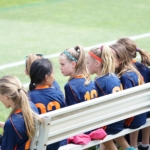
Mary Konstantopoulos is the founder of the ‘Ladies Who’ sports media empire, and has lived and breathed sport for as long as she can remember.
She grew up playing a variety of different sports, and fell into a deep passion for rugby league, and the Paramatta Eels specifically, in her youth. Watching the NRL was one of the ways she connected with her family and being an Eels supporter was a major part of her family life.
As she tells Kate Mills on the latest episode of The Leadership Lessons, a Women’s Agenda podcast supported by Salesforce, the growth of women’s sport over the past seven years has totally changed her relationship with men’s sport.
While she still loves men’s rugby league and always will, she’s never been more inspired by women athletes. Hearing the stories of women in sport, and sharing them with her audience at Ladies Who League (also at Ladies who Legspin, Ladies Who Lineout and Ladies Who Leap), has given her such an appreciation for the commitment it takes to be a woman in sport.
“I remember a couple of years ago, I went to a sporting club that had a men’s team and a women’s team and a male athlete was asked about his challenges. He spoke about injury and how hard it was to come back from injury and the support his wife had given him during that period,” Mary explains on The Leadership Lessons.
“And then the woman athlete got up and spoke about juggling a family and a job and rushing from training and trying to fit in as many interviews as she could and helping out the next generation.
“In a way, women’s sport has changed my relationship with men’s sport just because of that commitment and that commitment to something that you love, is something I find really inspiring.”
Mary started Ladies Who League seven years ago, after a colleague put the idea into her head. Initially, the media platform was about encouraging more women to get involved in conversations about rugby league.
“At that point the women that I could see were in the administration and the women in the media. It wasn’t until I started digging into that space that I started to realise that Australia had a women’s rugby league team called the Australian Jillaroos,” Mary says.
“I realised that if I, as a passionate rugby league fan, didn’t know who they were, then there would be many others out there just like me. So, I started sharing their stories.”
Over the years, the Ladies Who media platform has grown substantially to the point where it now focuses on all areas of women’s sport. And while there are still many barriers facing women athletes and women’s sport, Mary is excited by all the professional competitions that are now established.
“Six years ago, there weren’t professional competitions established for many of our female sports and now I look across the board and we’ve got the Women’s Big Bash in cricket, the Women’s rugby league competition, we’ve got the Super W in rugby, Super Netball continues to go from strength to strength and we also have the women’s AFL,” she says.
“There was a moment last year, where I think the Diamonds were playing, Belinda Sharpe was about to referee her first NRL game at the highest level and the Australian women’s cricket team were competing at the same time.
“I had to give the remote to my partner so he could decide what we were watching because I found it so overwhelming. There was so much women’s sport on television!”
Mary points to equal pay as one of the major areas that needs to improve for women in sport, and explains that Cricket Australia has been leading the way in this space.
“If we look at the Australian women’s cricket team they are currently ranked Number 1 in the world…it’s not a surprise how much success they have had since becoming full-time professional athletes,” she says.
“Now what those women do is they compete, they play cricket and that is their job effectively and they are paid appropriately…and we see the result of that.”
“I find it funny when people criticise the AFLW because ‘it’s not as good as the men’s’ or ‘they’re not scoring as many points as the men’. The men are full-time professional athletes, whereas the women are not. They have far less time to devote to their craft because they are juggling plenty of other things.”
Having a prominent profile on social media, Mary considers herself lucky to find herself surrounded with mostly supportive people.
“Perhaps I have created a little bubble around me, but I have a lot of people cheerleading and supporting,” she explains.
Whenever negative comments or criticism pop up around her work – which thankfully, is not very often – Mary says she always comes back to the fact that what she’s doing is very much aligned with her purpose. It’s about working hard everyday to elevate the stories and voices of women in sport, and agitating the status quo.
“I feel like if I’m getting that criticism [on social media], it means I’m poking in the right direction.”





